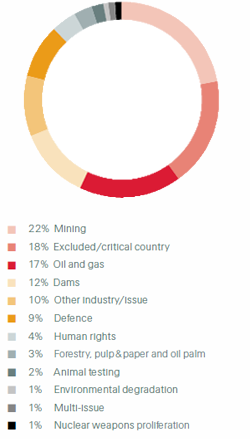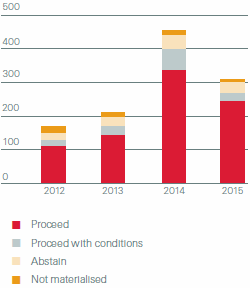The Sensitive Business Risks process
309
Sensitive business transactions referred to our team of sustainability experts
(454 in 2014)
3 550
Due diligence checks carried out by our underwriters to detect potential sustainability risks
Each of the eight policies of our Sustainability Risk Framework contains criteria and qualitative standards which define precisely when a transaction may present a “sustainability risk”. In 2015, we introduced a new online Sensitive Business Risk (SBR) assessment tool, which enables our underwriters to screen potentially sensitive transactions for their impacts on the local environment and on the human rights of the affected people and workforces.
The online tool is easy to access, provides clear guidance to our underwriters about what to assess in further detail and ensures consistent documentation in our standard underwriting tools. At the same time, it enables our central sustainability management unit to adjust key policy parameters and make them effective “at the push of a button”. We believe the tool has thus further strengthened due diligence of potential sustainability risks in our core business. In the first six months since its launch, our underwriters used it to carry out checks on 3 550 transactions.
If this initial screening reveals any potential issues, our underwriters carry out further due diligence measures. Finally, they transfer the most critical transactions through the Sensitive Business Risks (SBR) referral tool to our team of sustainability experts, who conduct targeted research to decide whether the transaction at hand is acceptable on ethical grounds.
This decision takes the form of a binding recommendation either to go ahead with the transaction, to go ahead with certain conditions attached, or to abstain. If there is disagreement about the recommendation, the case can be escalated to the next management level and, ultimately, to the Group Chief Risk Officer and the Group Executive Committee.
The accessibility and clarity of our new online assessment tool led to a decrease in the number of transactions referred to our sustainability experts for an assessment – from 454 in the previous year to 309 in 2015. Of these, we issued negative recommendations in 32 cases and positive recommendations with conditions in 24 cases.
Sensitive Business Risks referred to our expert team in 2015

Number of Sensitive Business Risk referrals

When making these decisions, we refer to internationally recognised ethical principles. Swiss Re is a signatory to the UN Global Compact, which derives its human rights principles from the Universal Declaration of Human Rights, its labour principles from the ILO Declaration on Fundamental Principles and Rights at Work, its environment principles from the Rio Declaration on Environment and Development and its anti-corruption principles from the United Nations Convention against Corruption.
This web of ethical principles helps us to make decisions that are aligned with universal fundamental rights. However, this is not sufficient for decisions in a business context. We also need to consider the social and economic implications of our decisions in their respective cultural contexts and, last but not least, the implications for our business. Balancing these different aspects requires us to carefully and consistently assess transactions and their local effects, often in collaboration and dialogue with external experts and local stakeholders.
Thus, our decisions are neither subjective nor entirely objective. In essence, they reflect our recognition of global fundamental rights, of human suffering and our commitment to limiting unwanted negative impacts of our business transactions, either by withdrawing or by influencing our clients’ behaviour.